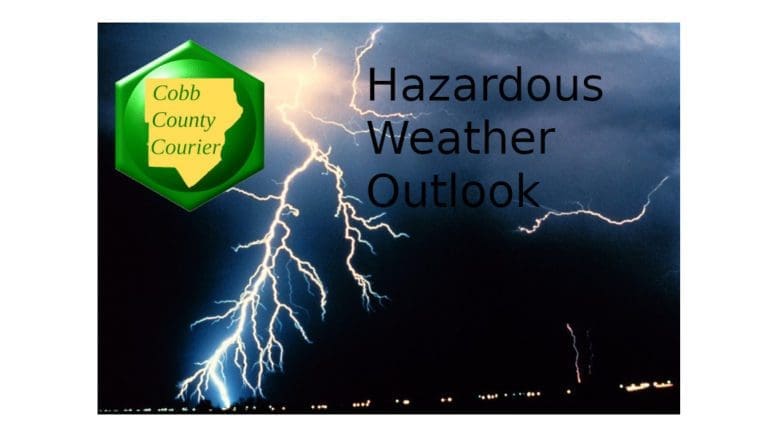The National Weather Service issued a hazardous weather outlook for Cobb County and other counties in the region for Tuesday Aug 15, 2023 as numerous thunderstorms are expected to spread across north and central Georgia with an advancing cold front.
In its online glossary the National Weather Service defines a cold front as “a zone separating two air masses, of which the cooler, denser mass is advancing and replacing the warmer.”
What is in the statement?
The hazardous weather outlook gives the following details:
This Hazardous Weather Outlook is for portions of North and
Central Georgia.
.DAY ONE…Today and Tonight…
A Heat Advisory is in effect from 10 AM until 8 PM EDT for
portions of central and east Georgia. Heat index values of up to
106 degrees are expected. Appropriate precautions should be taken
to avoid heat related illnesses, including but not limited to
drinking plenty of fluids, using air-conditioning when possible,
staying out of the sun, and checking up on relatives and
neighbors.
Numerous showers and thunderstorms are expected today into
tonight as a cold front advances through north and central
Georgia. A few storms associated with this system may become
strong, capable of producing gusty winds, frequent lightning, and
locally heavy rainfall.
.DAYS TWO THROUGH SEVEN…Wednesday through Monday…
Scattered thunderstorms will be possible primarily in
central Georgia each afternoon and evening from Wednesday through
Sunday.
What is the difference between “isolated” and “scattered” thunderstorms?
The NWS defines “isolated” as follows:
A National Weather Service convective precipitation descriptor for a 10 percent chance of measurable precipitation (0.01 inch). Isolated is used interchangeably with few.
“Scattered” has the following definition:
When used to describe precipitation (for example: “scattered showers”) – Area coverage of convective weather affecting 30 percent to 50 percent of a forecast zone (s).
In other words isolated means a few showers, scattered means the showers are likely to cover 30 to 50 percent of the affected region.
What counties are affected?
The following counties are included in the hazardous weather outlook:
Baldwin, Banks, Barrow, Bartow, Bibb, Bleckley, Butts, Carroll, Catoosa, Chattahoochee, Chattooga, Cherokee, Clarke, Clayton, Cobb, Coweta, Crawford, Crisp, Dade, Dawson, DeKalb, Dodge, Dooly, Douglas, Emanuel, Fannin, Fayette, Floyd, Forsyth, Gilmer, Glascock, Gordon, Greene, Gwinnett, Hall, Hancock, Haralson, Harris, Heard, Henry, Houston, Jackson, Jasper, Jefferson, Johnson, Jones, Lamar, Laurens, Lumpkin, Macon, Madison, Marion, Meriwether, Monroe, Montgomery, Morgan, Murray, Muscogee, Newton, North Fulton, Oconee, Oglethorpe, Paulding, Peach, Pickens, Pike, Polk, Pulaski, Putnam, Rockdale, Schley, South Fulton, Spalding, Stewart, Sumter, Talbot, Taliaferro, Taylor, Telfair, Toombs, Towns, Treutlen, Troup, Twiggs, Union, Upson, Walker, Walton, Warren, Washington, Webster, Wheeler, White, Whitfield, Wilcox, Wilkes, Wilkinson
About the National Weather Service
The National Weather Service (NWS) is a part of the National Oceanic and Atmospheric Administration (NOAA).
The NWS describes its role as follows:
“The National Weather Service (NWS) provides weather, water, and climate forecasts and warnings for the United States, its territories, adjacent waters and ocean areas, for the protection of life and property and the enhancement of the national economy.
“These services include Forecasts and Observations, Warnings, Impact-based Decision Support Services, and Education in an effort to build a Weather-Ready Nation. The ultimate goal is to have a society that is prepared for and responds to weather, water and climate events.”

